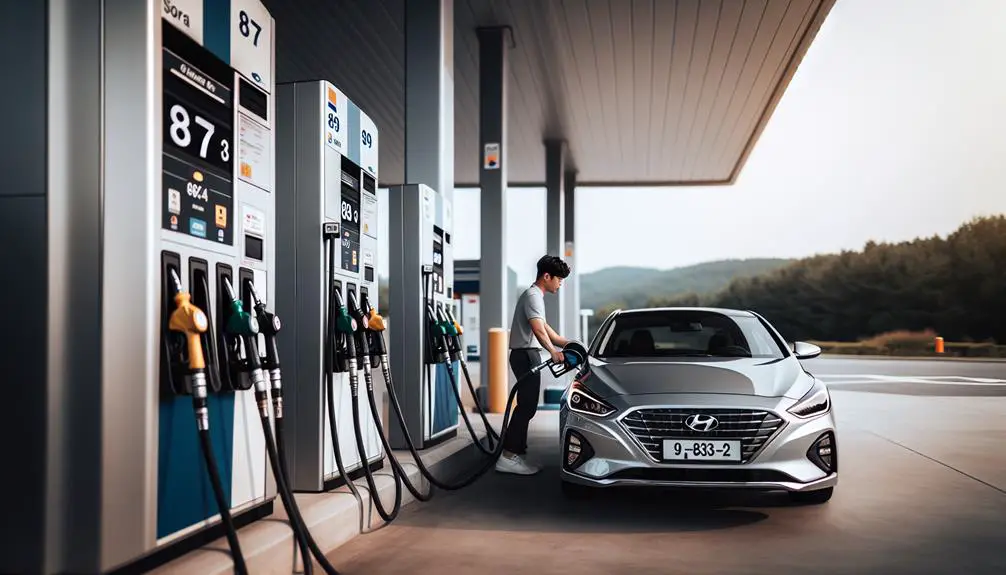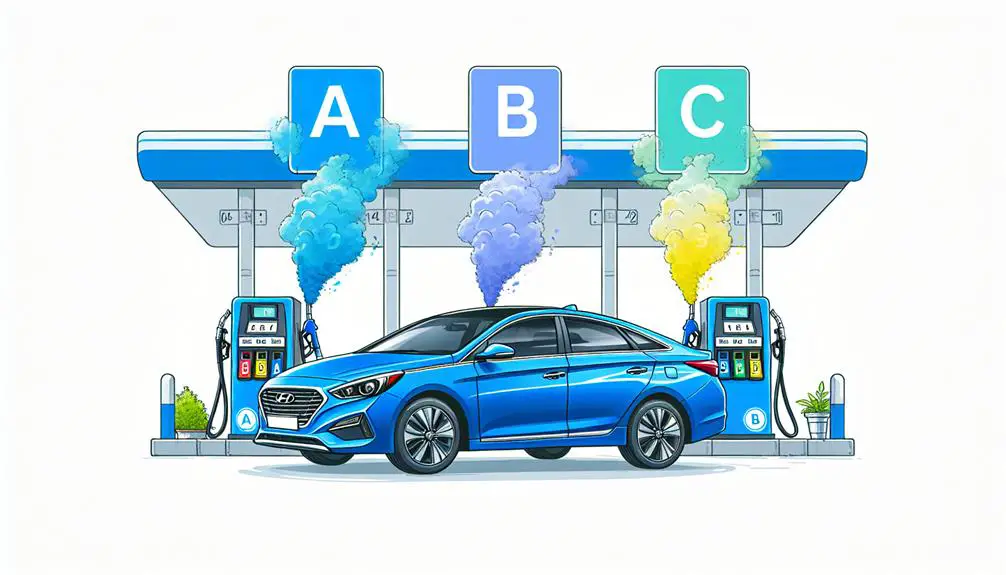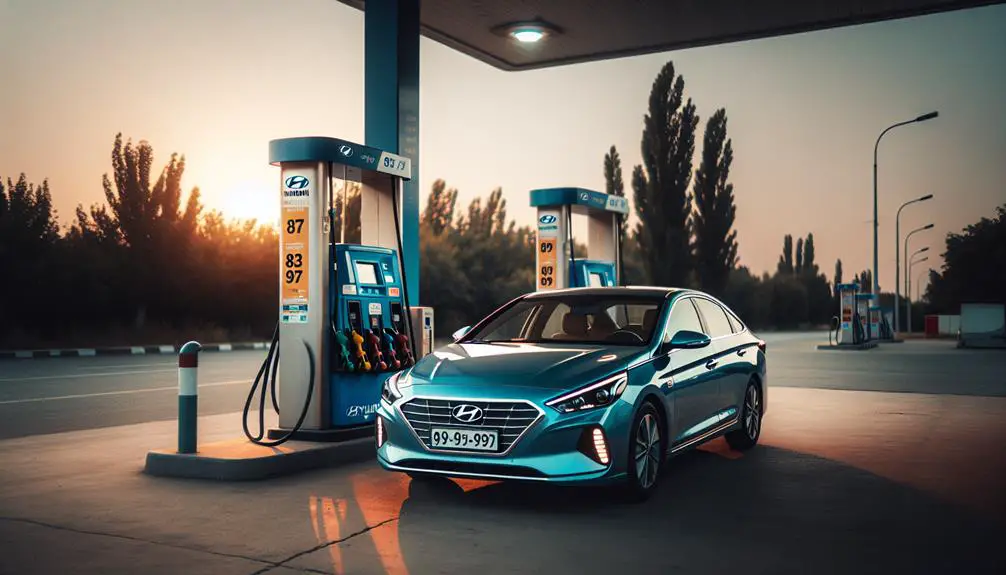For a Hyundai Sonata, you should primarily use regular unleaded gasoline with an octane rating of 87 unless the owner's manual specifically recommends or requires premium gasoline. Using premium gas in a Sonata that doesn't require it won't significantly boost performance and is not cost-effective.
Always refer to your vehicle's owner's manual for the recommended fuel type to ensure optimal efficiency and engine longevity.
Understanding Fuel Grades

To choose the right gas for a Hyundai Sonata, it's important to know about fuel grades. Each type of gas has a different octane level, which affects your car's performance and engine health.
Regular unleaded gasoline has an octane rating of 87. It's the most common and cheapest type, suitable for engines that don't need high octane to avoid engine knocking. Engine knocking is a noise made by early fuel combustion in the cylinders.
Mid-grade unleaded has an 89 octane rating. It's better than regular for cars that sometimes knock with regular gas but don't need the highest octane.
Premium unleaded has octane ratings from 91 to 93. It's for high-performance or luxury cars that need it to avoid knocking and run smoothly. Using premium in a car that doesn't need it doesn't improve performance; it just costs more.
Knowing these fuel grades helps you pick the right gas for your Sonata, ensuring it runs well without extra cost. It's about what your car needs, not the gas price.
Sonata's Fuel Requirements
For optimal performance, the type of gas your Hyundai Sonata needs depends on its model year and engine type. Most Sonatas work well with regular unleaded gasoline. Here's a simplified guide:
- Regular Unleaded Gasoline: Most Sonata models are fine with 87 octane regular unleaded gasoline. This is the cheapest option and works well for most situations.
- Higher Octane for Turbo Engines: For Sonatas with turbo engines, using premium gasoline with a higher octane might improve performance and efficiency, but it's not required.
- E10 Ethanol Blends**: Sonatas can use gas with up to 10% ethanol. E10 is common and okay for your car, balancing performance and eco-friendliness.
- Avoid E15 or Higher Ethanol Fuels**: Don't use gas with more than 10% ethanol, like E15 or E85. It can damage your Sonata's engine and fuel system if not designed for it.
Impact of Fuel Choices

Choosing the right gas for your Hyundai Sonata affects its performance and life. Your fuel choice impacts the car's efficiency and emissions. Using the wrong fuel can cause engine problems, reduce fuel economy, and lead to costly repairs. The correct fuel improves performance and reduces environmental harm.
Here's a simple guide on fuel choices and their effects on your Sonata:
- Regular Unleaded: Good performance, suitable for most models.
- Mid-grade Unleaded: A bit better performance, optional.
- Premium Unleaded: Not beneficial for standard engines, not worth the extra cost.
- Ethanol Blends: Can lower emissions but might reduce fuel efficiency.
- Diesel: Harmful, not suitable, can damage the engine.
What Is the Gas Mileage for a New Hyundai Sonata?
The gas mileage for a new Hyundai Sonata is highly impressive, especially considering the price of the car. With its efficient engine and aerodynamic design, the Sonata offers an excellent fuel economy, making it a great choice for those looking for a cost-effective and environmentally friendly vehicle.
Premium Vs Regular Gas
Let's compare premium and regular gas for a Hyundai Sonata to understand which is best:
- Octane Rating: Premium gas has a higher octane rating, usually 91 or more, while regular gas has 87. High octane gas prevents knocking in high-performance engines that need premium gas.
- Engine Compatibility: Most Hyundai Sonatas work well with regular unleaded gas. Only use premium if your Sonata is a high-performance version that requires it, as it won't improve performance or fuel economy in other models.
- Cost Effectiveness: Regular gas costs less than premium. If your Sonata doesn't need premium gas, using regular saves money without harming your engine.
- Potential Benefits: Some think premium gas is better for engines because of extra additives. But, for most Sonata models, the benefits don't justify the higher cost if the car runs on regular gas.
Maintaining Your Sonata

To ensure your Hyundai Sonata runs well, follow a regular maintenance schedule. Check the manual for the manufacturer's advice on oil changes, tire rotations, and other important tasks. Usually, you should change the oil every 5,000 to 7,500 miles, but confirm with your manual. Using the correct oil is important for engine efficiency and to avoid damage.
Keep tires inflated to the recommended PSI to prevent uneven wear and improve fuel efficiency. Rotate tires roughly every 5,000 to 8,000 miles to help them last longer and improve driving performance.
Also, pay attention to your brakes, filters, and fluids. Change brake pads before they completely wear out to save money and stay safe. Regularly replace air and cabin filters to help your engine and AC perform better. Monitor and maintain fluid levels, including engine coolant and brake fluid, for your Sonata's health.
Conclusion
To sum up, it's important to know the best gas for your Hyundai Sonata. Usually, regular unleaded gas is fine and helps you save money without affecting how well your car runs. But, if your car's manual says it's better to use premium gas, it's a good idea to do that.
Using the right gas makes sure your car drives smoothly and the engine works great. Always remember to check what kind of gas your Sonata needs and fill it up wisely!